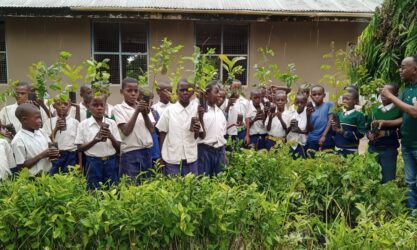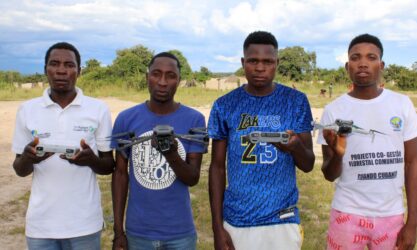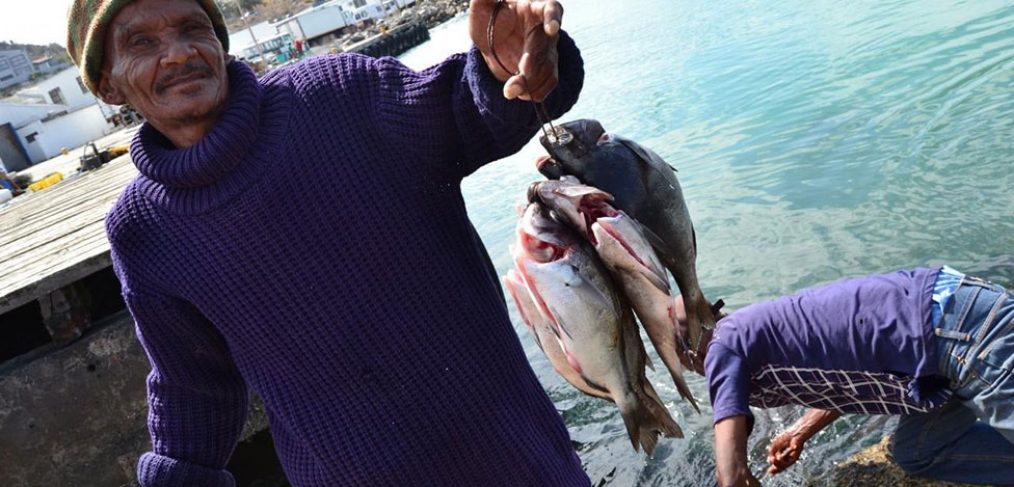
Endangered: Small scale fishermen and the African penguin? by Takdeera Lewis
The 2021 theme for World Oceans Day is The Ocean: Life and Livelihoods. With marine resources especially important for the coastal communities in Africa, the ocean is vital for countless livelihoods on the continent and throughout the globe.
To mark World Oceans Day this June 8, we bring you a report written by one of our CLN youth members, Takdeera Lewis, about a small-scale fishing community in the Western Cape whose lives and livelihoods have been impacted by social inequity in fishing policies.
Marine Protected Area management and the implementation comes from top down,” says Solene. “They do not include us as we are not a co-management structure, and our wish is to have a co-management structure that must include small-scale fisherfolk”.
Solene Smith is a fisherwoman. She is also the chairwoman of Coastal Links, Langebaan. Coastal Links Langebaan is an affiliate of Mafundise, a civic organisation that supports small scale fishing communities to advocate for legal recognition by self- sufficiency and self-organisation. Smith claims the actions of that the Langebaan Lagoon Marine Protected Area threatens the lives and livelihoods of her and her fellow fishing community.
Smith explains “In 2016 Coastal links Langebaan launched a lawsuit against the Department of Agriculture, Forestry and Fisheries. We won the case against the Western Cape High Court, but the permits issued to us by DAFF goes against the rulings of the court and takes us right back to square one.” The Langebaan Lagoon MPA is divided into zone A, B and C. Traditional fishers were excluded from zone B, their traditional fishing grounds and were restricted to fish solely in zone A where they had to compete with recreational fisheries and holiday makers. These restrictions were imposed on the fishing community while commercial fishing by white landowners still occurred in zone B. A portion of zone B was used to form zone C which was meant for conservation efforts. The fishing community had no objections to the formation of zone C as they support the preservation of marine life from which they depend on.
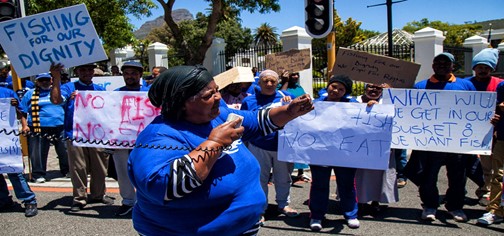
Solene Smith and fisherman protesting at parliament for the implementation of small scale fishing policy and to have equal rights recognition with bigger commercial fisheries – 2016
The judge ruled in favour of the fishing community and restored the rights to fish in Zone B, however, permits issued by DAFF stated that they were still restricted from fishing. The decision was made without consolidation from the fishing community.
Pressure on the small-scale fishing sector is further exacerbated in the form of no formal rights allocation and the use of interim relief fishing permits. The IRP’s has not been uniformly distributed and excludes many bona-fide fisherman, it has made conditions especially difficult during the COVID-19 pandemic.
Solene, 64 believes that the indigenous knowledge and long-standing experience possessed by her and her community can aid in effective decision making concerning their livelihoods. Solene says fishing is in her blood and comes from a long line of fisherman she became a fisherwoman the day she married a fisherman in 1981. She has lost family members at sea and today she spends her days involved in the progression of the SSF community while supporting her family on fishing.
Solene and her fishing community is part of my research project. Currently I am approaching a master’s degree in wildlife conservation at the University of Pretoria.
I chose to do a project that assessed the views of an array of stakeholders in the current conservation strategies for the African Penguin.
AFRICAN PENGUINS, SMALL-SCALE FISHERFOLK AND RESOURCE RIGHTS
The African penguin is endemic to the coastline of Southern Africa. It has seen drastic declines in the last century.
The most prominent threat driving the ongoing decline of African penguins is competition with commercial fisheries.
Penguins and the pelagic fishing industry are after the same marine resources, sardine, and anchovy. However, due to the high economic value associated with commercial fishing both penguins and small-scale fishing industries needs takes a back seat to its commercial counterparts. This feeds into an unequal system where small-scale fisherman have lost access to traditional rights and the fishing sector is monopolised by established sectors who can afford access to it. Penguin species are threatened and are at the risk of extinction if solutions fail to bridge the gap between all working parties.
But this is only part of the story of human- wildlife conflict, which present unique socio-ecological challenges.
For example, the effectiveness of MPA’s is established through experimental fishing closures around penguin breeding colonies. The extension of fishing closures and more importantly the implementation of MPA’s is largely supported by scientific research and a significant number of scientists. However, this practice disregards the social dimensions in the fishing system, notwithstanding the contribution the fishing community as stakeholders can make towards addressing the current human-wildlife conflict and to guide colony-specific management.
It is the small-scale fisherman alone who can testify to the long-standing issues concerning social inequity in fishing policy.
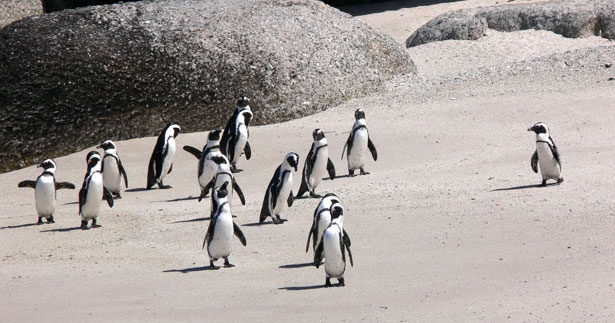
Jackass Penguins
ACCESS AND BENEFIT SHARING
In South Africa fishing activity is subjected to many restrictions.
These restrictions are supported by relevant fishery data to maintain viable marine environments. However, marine protected area management implementation agencies fail to account for the customary and traditional rights of small-scale fisherman. In some areas small scale fisherman are excluded from accessing resources. They are excluded from various stakeholder advisory forums while commercial and eco-tourism fishing activities are prioritised over the rights of SSF.
There has been no participation between MPA planning bodies and SSF communities. Currently regulations are enforced on MPA’s and failure to comply results in prosecution. The lack of involvement and understanding regarding these regulations has led to illegal fishing. This is viewed as a huge threat to MPA’s and is dealt with harshly.
In 2019 an audit was launched to review the SSF rights allocation process in the Western Cape. It revealed several discrepancies by applicants in the application process. However, the review excluded many fishermen that were factored out from the process across the country.
The review should be relaunched in conjunction with fisherman concerns and extended to fisherman across the country. Barriers from participation should be removed by the provision of capacity and resources and fisherman should be allowed continued access while the issues are being addressed.
Marine protected area implementation should include the co-management with the fishing communities. This will go a long way in restoring rights back to communities and communities need to be prioritised in the decision-making process that their livelihoods are significantly depended on.
My project aims to highlight the plight of disenfranchised individuals that form part of marginalised communities. It is important that traditional fisherfolk be recognized as central stakeholders, vital to the economic, social, and environmental sustainability of both their communities and of their marine resources.
PEOPLE ARE PART OF CONSERVATION
I was first introduced to the human dimension to conservation in a lesson prepared by an Italian expatriate. Prior to this, my awareness of conservation issues embodied the western narrative where wildlife and the natural environment are at the hands of exploitive humans.
My interest in conservation and my efforts towards the cause is formed at the intersectionality of my identity. I am a Muslim woman of colour from a disadvantaged background. Like many others that share my background, I am a first- generation graduate.
As an African, I am cognizant of the western researcher observing our realities and a significant body of researchers but not all share an obscured interpretation that ultimately champions hegemonic discourse.
The problem lies in a misrepresentation that consequently disadvantages rural communities. Dr Clara Bocchino has forged herself a position outside of the sphere that contributes to western knowledge production. She extended her knowledge of the topic and relayed the anecdotes of her work. She approached the topic with discernment and sensitivity.
I am not saying that I am the gate keeper to understanding the struggles of my fellow Africans, but I am of the conviction that my identify affords me the necessary sensibilities to grasp an understanding that I share with that of marginalised communities.
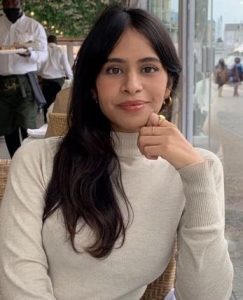
About the author:
Takdeera Lewis graduated from Stellenbosch university with a BSc. Agric. in Animal Science. She is currently a Master student at Univerisyt of Pretoria studying Wildlife Health & Management.. her research project is partnered with Meervissen, a German African collaboration for ocean conservation. Takdeera is a volunteer at SANCCOB (South African Foundation for the Conservation of Coastal Seabirds.)

